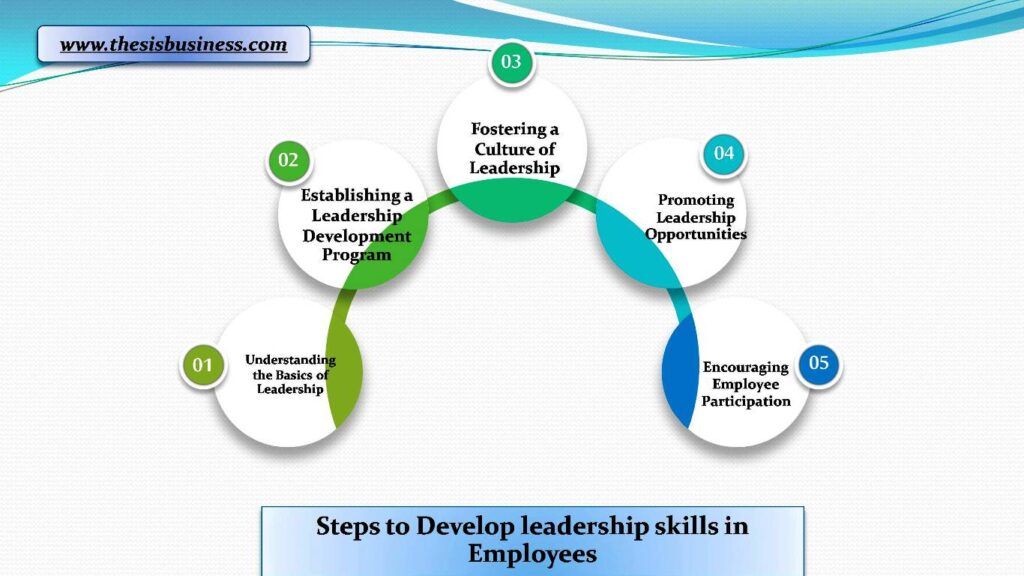Leadership is an essential quality for success in any professional setting. To ensure that an organization’s employees are working towards the same goal, they must have the ability to lead and motivate others. Therefore, developing leadership skills in employees is an essential task for any organization, as it enables them to maximize the potential of their workforce and create a culture of collaboration and teamwork.
In this article, we will explore the various ways to develop leadership skills in employees and how to apply them to create a productive and successful workplace.
Table of Contents
7 Tips to develop leadership skills in Employees –
1. Understanding the Basics of Leadership
Leadership is a complex concept, and any organization must clearly understand it. Generally speaking, leadership is about influencing people, motivating and inspiring them to work potentially and achieve their goals.
It is significant to identify different characteristics required for effective leadership, and understand different leadership styles, such as behavioral, autocratic, situational, transformational, participative, transactional, etc., and how they can be applied in different situations.
2. Establishing a Leadership Development Program
Once a basic understanding of leadership has been established, it is vital to create a program to develop leadership skills in employees. For example, we can provide training opportunities and workshops focusing on developing skills such as communication, problem-solving, decision-making, and team-building.
Additionally, it is crucial to provide employees with feedback and guidance throughout the process to ensure they are on the right track. It can do it through regular one-on-one meetings, group sessions, and workshops.
3. Fostering a Culture of Leadership
For a leadership development program to be successful, it is essential to create a culture that encourages and supports leadership. For example, we can create an environment that values and rewards leadership skills, such as recognizing employees who demonstrate strong leadership qualities.
It is also essential to encourage employees to take on leadership roles, such as leading teams or projects, to develop their skills further.
4. Promoting Leadership Opportunities:

In addition to creating a culture that encourages leadership, it is crucial to provide employees with opportunities to demonstrate their leadership skills. We can do it by providing them with challenging tasks and projects that require them to take the initiative and make decisions.
Additionally, it is crucial to promote leadership opportunities within the organization by providing mentorship programs and encouraging employees to take on leadership roles.
5. Encouraging Employee Participation:
Finally, it is essential to encourage employee participation to ensure that the leadership development program is successful. It can be done by engaging employees in the process by providing them with feedback and guidance and involving them in decision-making.
Additionally, it is vital to ensure that employees understand the importance of leadership and how it can benefit the organization. By fostering a culture of collaboration and teamwork, organizations can create an environment that encourages leadership and motivates employees to reach their full potential.
6. Give Stretch Assignments to Learn New Skills:
Giving stretch assignments to employees is a great way to help them develop their leadership skills. By providing challenging tasks that require employees to think outside the box and use their creative problem-solving skills, you can help them hone their leadership abilities.
For example, you could assign a team project that requires them to come up with a solution to an issue that is not immediately obvious. It could be anything from reducing costs in a particular area to finding a new marketing strategy to increase sales. By coming up with a creative solution, they will be forced to think critically and use their leadership skills to come up with the best outcome.
Finally, provide feedback and guidance to your employees throughout the process. By doing this, they will be able to learn from their mistakes and grow as leaders.
It will help them develop their leadership skills more quickly and be more successful in their future endeavors. By giving stretch assignments and providing feedback and guidance, you can help your employees develop into strong leaders who can take on any challenge.
7. Delegate Authority:
When delegating authority, it is essential for the supervisor to clearly define the task or project and provide the necessary resources to ensure that the employee can be successful. It includes providing critical training and guidance and setting clear expectations and deadlines.
It is also essential to provide feedback and support regularly. It will help to ensure that the employee can achieve the desired results while also gaining the experience and skills necessary to become a leader.
Finally, building a culture of trust and respect between the supervisor and the employee is essential. It is done by providing positive reinforcement for a job well done and offering constructive criticism when necessary.
It will help to ensure that the employee is motivated to continue developing their leadership skills and will be more likely to take on more significant challenges in the future. Delegating authority is an integral part of developing leadership skills in employees and is an essential part of any successful organization.
8. Provide a Mentor:
A mentor can also guide and support employees when they face difficult decisions or challenges. A mentor can help employees become more confident and provide emotional support and motivation.
Mentors can also help employees identify their strengths and weaknesses and help them create a plan for how to use their strengths to achieve their goals.
In addition to providing guidance and support, mentors can also help employees develop their technical and organizational skills. For example, mentors can advise on creating and managing projects, organizing workflows, and developing effective decision-making processes. By having a mentor, employees can become more confident in their ability to successfully manage their tasks, as well as their ability to lead others.
Overall, providing a mentor to employees can be a great way to develop their leadership skills. Mentors can provide guidance and support, help employees identify and utilize their strengths, provide emotional and technical support, and help them become more confident in their abilities. As a result, employees can gain the skills they need to become influential leaders by having a mentor.
9. Send Employees Through External Training Programs:
Investing in developing leadership skills in employees is a great way to improve the success of any organization. One of the most effective ways to do this is to send employees through external training programs.
These programs allow employees to learn from experienced experts, acquire new knowledge and skills, and apply them in everyday work.
External training programs can help employees to become more effective leaders by providing them with the tools, strategies, and techniques they need to succeed. Through the program, employees receive coaching and mentoring from experienced professionals and guidance on developing their leadership skills.
They also receive training in communication, problem-solving, decision-making, and team-building, all of which are essential skills for influential leaders.
External training programs can be expensive and time-consuming, but they are worth the investment. Organizations can benefit from improved performance, higher levels of employee engagement, and enhanced morale by equipping employees with the skills and knowledge they need to lead effectively. Investing in developing leadership skills in employees is an investment that can pay off in the long run.
Conclusion:
Developing leadership skills in employees can have significant benefits for both the employee and the company as a whole. By facilitating opportunities for employees to hone their leadership skills, companies can foster a culture of growth and innovation and increase loyalty and productivity.
As such, they are investing in developing employees’ leadership skills, which is an integral part of any effective management strategy. Understanding the different qualities that make up effective leadership, such as communication, problem-solving, decision-making, and team-building is necessary.

